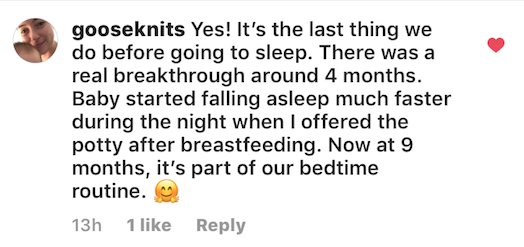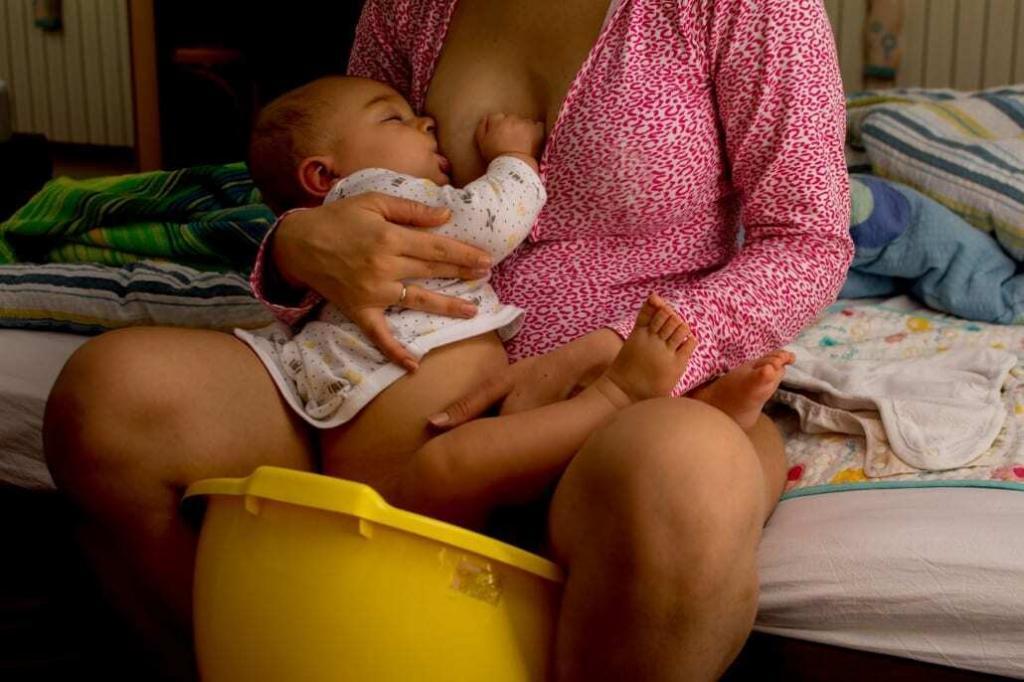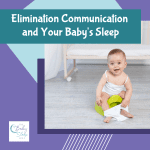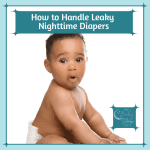
by Andrea Olson of Go Diaper Free
After years and years of teaching elimination communication (or EC) to parents with little babies, one of the biggest challenges they face is balancing EC with good baby sleep. In a recent survey of our Go Diaper Free community, one-third of parents said that Nighttime EC was their biggest challenge.
Many new parents who practice EC will wonder:
- Should I practice elimination communication at night?
- How will EC affect my baby’s sleep?
- Will it harm our EC practice if I do not potty my baby at night?
So many questions!
Let’s answer those and more with my 7 biggest tips to balance EC and sleep. Starting with the Golden Rule.
The Golden Rule: Only do nighttime EC if it helps the entire family sleep better
This is the big, giant, overarching “golden rule” of night pottying: only potty your baby at night IF it helps the entire family sleep better.
With newborns, it’s pretty straightforward. If you start EC at birth-3 months, doing EC at night will very likely help your baby sleep much better. In what’s called the “4th trimester,” babies are very primal in their needs, and the instinct to be clean and dry is at its highest. Doing EC at night with a newborn can help the entire family sleep better.
Here’s an example of our night routine with a newborn baby, when we are bedsharing, night nursing, and doing nighttime EC in the first few months of life:
baby stirs to wake up, I offer the top hat potty in bed, baby pees and poops in it, I re-diaper, I nurse baby back to sleep – clean, dry, fed, and comfortable.
If your baby would prefer to nurse first and resists the potty, then by all means skip the pottytunity! Sleep always trumps pottying…because a well-rested baby is a happy baby (and well-rested parents are happier, too).
With an older baby, parents may find that EC disturbs a pre-existing healthy sleeping pattern. Their baby will wake up in order to use the potty, or because they are wet – and from doing EC, they’ll demand to be changed immediately. This doesn’t happen all the time, but it can negatively affect sleep in the beginning stages of starting EC with an older baby. (If this happens, ordering a custom sleep plan would help…just mention that you do EC!)
Additionally, a very tired postpartum Mama may not want to get up with baby night after night to go to the bathroom and nurse back to sleep. She may want her baby to sleep through the night when it’s developmentally appropriate for that to happen. I’ve definitely been there, myself! In this case, doing EC at night is not helping Mama sleep…so therefore this Mama may not want to do nighttime EC at this time. (Night dryness can always be addressed later.)
The moral of the story is this: if EC at night helps the whole family get better sleep, do it. If not, skip it for now.
Next, let’s discuss naptime.
Offer the potty strategically for a more comfortable nap
Always offer the potty when you notice your baby beginning to get sleepy…before they become overtired. Getting sleepy? Offer the potty as part of their pre-naptime routine…before they get too fussy.
Then settle baby down for sleep however you currently do that: rocking, nursing, or even just laying your baby down. (If you need help with that, join the Baby Sleep Site members area here.)
An empty bladder and bowels will help baby drift comfortably off to sleep.
I also recommend offering the potty when your baby wakes up. This is the time when those who don’t do EC will change the diaper…offer the potty at that time and eventually your baby will understand that this is part of the routine – and it’s an opportunity for him to use the toilet every time he wakes up.
If baby wakes in the middle of what should be a longer nap, you can either offer the potty (if baby easily goes back to sleep after) or use the diaper as a “back-up” and soothe baby back to sleep, teaching her to take a longer nap. Whether your baby wakes up wet or dry after a nap is not as important as providing a pottytunity before sleep, and offering one upon waking.
Now let’s look at nighttime sleep and bedtime habits.
The best pottytunities for a better night’s sleep
I’ve described one example of newborn nighttime EC previously, but what about mobile babies and young toddlers? What do we do differently when we get to ages where baby can now sleep through the night, and we want to support that?
Well, there are 4 times you can offer the potty at night that may help your baby be more comfortable and dry (and not disturbed by the need to pee).
As this mama shared on our Instagram the other day, offering these pottytunities can make everything smoother at night:

If your baby is comfortable, she’s gonna sleep better. If your baby needs to pee or poop, it will disturb the going-to-sleep process.
So, for mobile babies and walking toddlers up to 18 months old, it is often helpful to integrate one or all of these four strategic “pottytunities” (opportunities to use the potty) into their nighttime routine:
- Final pee. Make a “final pee” part of your bedtime routine. Everyone in our family, newborn to grown up, gets the opportunity to pee right before bed. All the kiddos are given a small sip of water from a tiny Dixie cup, then taken for their final pee, then tucked into bed. Your routine may vary, just be sure to offer a final pee as late in the bedtime routine as possible.
- Dream pee. Use the “dream pee” to prevent nighttime accidents. Dim the lights and potty baby in the bedroom on a mini potty or top hat potty, then back to bed without a conversation. You can do this earlier in the night when you, the parent, goes to sleep (for example: 10:30/11pm) or you can do this early in the morning…about 15-30 minutes before baby typically wakes up with a wet diaper (example: 4:30am), then back to sleep. The goal is never to fully awaken your child, just to quietly offer the potty in the dark, and put her back to bed without disturbing her sleep, allowing her smaller bladder some relief in the middle of a long night’s sleep.
- Morning pee. Always offer a “morning pee.” If baby is wet when you get to her, offer the potty anyway as part of your morning routine. You can also try setting an alarm to get her sooner, or use a video or audio baby monitor to hear when she first starts to stir. All humans have a hormone that wears off when we begin to wake up after deep sleep; the bladder then fills and we need to eliminate. (I call this one an “easy catch” and it’s a great way to ease into EC with your baby.)
- At any wake-up. When you change baby’s diaper, offer the potty and get baby back to sleep however you typically do. Do what works for you, such as: nurse then potty, then back to sleep, or potty then nurse, then back to sleep. Part of the reason they’re awake is that they are uncomfortable (hungry, need to potty, cold) and offering the potty at a wake-up will help them feel comfortable enough to drift back to sleep.
Next let’s discuss daytime sleep and how it affects nighttime sleep…and EC.
Good daytime sleep habits will help your baby sleep well at night
Everything you do in the day affects what your baby does at night. I highly recommend learning about good daytime sleep habits so that your baby does not wake up all night to nurse, which in turn causes him to need to pee, which can cause a lot of lost sleep!
Good daytime sleep habits (and good daytime EC habits) trickle over into nighttime – either causing comfortable deep sleep…or a night full of wakeups, feeding, and potty times.
When we began putting our babies down for daytime naps without resorting to nursing, it vastly improved our babies’ quality of sleep at night. Learn more in the Baby Sleep Site VIP Members Area.
Know that you can opt-in, or out, of nighttime pottying as you go
I want you to know that, when doing EC, it is completely optional to offer the potty at night. Parents often choose to do EC part-time, and to leave the nights for sleeping. The tips in this post will get you started, but I definitely recommend learning more about Nighttime EC so you can do it with confidence.
And, no, it will not harm your EC success if you do not potty your baby at night. Nighttime dryness naturally follows daytime dryness, so if it doesn’t work for your family, you can use a back-up at night until you’re ready to focus on being diaper-free during sleep. (If you want to wrap up nighttime potty training – whether you practiced EC or not – with a child over 18 months, you can check out my potty training book for some easy how-to’s.)
If you do decide to potty your baby at night, things may be up and down over time. As your baby grows and hits developmental milestones, he may begin resisting the nighttime “pottytunities.”
It’s been going well for weeks or months, easily and effortlessly pottying at night then back to sleep…and the all of the sudden…bam! Total resistance. In this situation, you can take a break from nighttime EC or get creative with the next tip…
Get creative if you’re facing nighttime EC resistance
Sometimes baby has pottied cooperatively at night for many months, and then suddenly cries in protest about peeing at night. If this happens, no worries. You can either opt out of offering at night for a time, or get creative by nursing while pottying.

Nursing during pottying can prove to be a useful, if acrobatic, trick: you can either nurse your baby over a top hat potty or bowl, or over a mini potty or the sink or toilet, and signal by saying “pssss” or “peepee” or running water as you offer while nursing. (Be sure to aim if you have a boy!)
Lastly, let’s demystify what to dress your baby in during naps and nights for the most comfortable sleep…and the smoothest EC experience.
Use the right “back-up” at night
Doing elimination communication involves a simple paradigm shift: the diaper is no longer a permanent toilet…it is now a “back up” for when parent and baby miss one another or when parents are too busy (or choosing to practice part-time EC).
No matter what age your baby is in the EC range of 0-18 months, it’s important to dress baby in the nighttime “back-up” that is going to best support your goals. Back-ups can include disposable diapers, cloth diapers, split pants, tiny underwear, cloth training pants, commando, and naked on the bottom.
As with daytime elimination communication, I recommend dressing your baby in a back-up that encourages her to signal for the bathroom the best, that helps her get the best sleep, and that helps keep the bed (and her) dry. If you are prioritizing baby sleep over EC at this time, then use a backup that keeps baby feeling dry while also aligning with your parenting values.
Over the course of doing EC with your baby, the back-up may change depending on how your goals change. If you’re going for diaper-free naps or night sleep, then you’ll use a back-up that feels the least like a diaper.
And that’s it. I hope the above tips will help you wrap your head around how to give your baby the best chance at sound sleep, while also honoring your baby’s instincts to stay clean and dry with elimination communication.
If you should need any guidance on EC, day or night, please check out my popular elimination communication book and visit my blog at godiaperfree.com. For top hat potties, mini potties, tiny underwear, tiny training pants, and cloth pull-up covers, please visit my sister site, tinyundies.com…because when they’re out of diapers this early, what will they wear? I look forward to helping you and your baby be “diaper-free” – or free from exclusive dependence upon diapers – day and night.

Andrea Olson is the proud mama of 5 children – all ECed from birth, all out of diapers by walking – and owner of Go Diaper Free and Tiny Undies. When she started Elimination Communication with her first baby, she struggled with how to actually potty her newborn – where were all the visual, simple instructions…and were there any other parents doing EC? Since then, Andrea has made it super-simple for 100,000s of parents worldwide to start EC with their own babies, as early as birth…and has trained over 300 coaches to host EC communities across the globe. She lives in Asheville, NC, with her husband, kiddos, sweet kitty, and (at last count) 18 backyard chickens.
Andrea’s Sleep Story:
When our 4th baby was 7 weeks old, he would cry nonstop from 7 pm to midnight every night, completely exhausted. He would not settle down for sleep without the five hour struggle, no matter what we tried. We ordered a Personalized Sleep Plan from The Baby Sleep Site and counted the minutes til we received it. With that and the email follow-ups (which we definitely used on crisis days), our newborn sleep problem was solved within a week. When we hit more hiccups a few months down the road, our sleep consultant was responsive and helpful. Branson was sleeping through the night pretty soon thereafter…and we couldn’t have done it without you!
Interested in learning more about Elimination Communication and sleep? Read more on The Baby Sleep Site Blog HERE!








